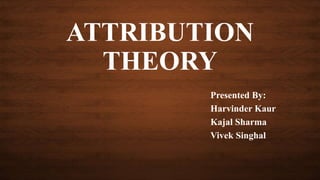
Attribution theory
- 1. ATTRIBUTION THEORY Presented By: Harvinder Kaur Kajal Sharma Vivek Singhal
- 2. Attribution The ways in which people come to understand the causes of their own and others’ behaviors.
- 3. Attribution Theory Introduced by Freitz Heider in 1958. How do we attach meaning to other's behavior, or our own is called as Attribution Theory.
- 5. Types of Attribution There are two types of Attribution Theory according to Fritz Heider: Personal Attribution Situational Attribution
- 6. Personal or Internal Attribution: Explain an outcome by looking within an individual. Situational or External Attribution: Explain an outcome by looking outside of an individual.
- 8. Some Attribution Errors Self-serving bias Fundamental Attribution Error Halo effect
- 9. Self-Serving bias • People do not make objective situational / personal attributions for their own behavior, though. • They tend to attribute their successes to dispositional factors, and their failures to situational factors. • For example: “I did well on the test because I am smart,” or “I did poor on the test because I didn’t get enough sleep.
- 10. Fundamental attribution Error • The tendency to attribute the behavior of other people more to internal than to external. • Refers to Our tendency to see the person rather than situation as the Main cause of person’s behavior. • Example: if a person is late for work Observers are more likely to conclude that he is lazy than to consider the external factors.
- 11. Halo Effect • To draw the general Impression of an individual on the basis of his single characteristic. • A big attritional Error. • Example:-If a person having good formal dressing sense is late. Observer make a conclusion that the external causes are responsible then internal causes.
- 12. Conclusion Keeping in mind the Attribution Theory a person should always think before he reacts. He should not always believe what he sees but should also focus on the both situational and personal attributions and after that only he/she should judge the person. A person should not blame others for any situation or if any bad thing is taking place.
- 13. THANK YOU